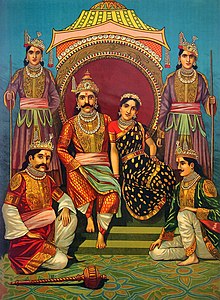Pandava
The Pandavas (Sanskrit: पाण्डव, [paɳɖɐʋᵊ], IAST: Pāṇḍava) is a group name referring to the five legendary brothers, Yudhishtira, Bhima, Arjuna, Nakula, and Sahadeva, who are central figures of the Hindu epic Mahabharata.In the epic, the Pandavas married Draupadi, the princess of Panchala, and founded the city of Indraprastha after the Kuru Kingdom was split to avoid succession disputes.However, the Pandavas lost their kingdom to Duryodhana (eldest and king of the Kauravas) when Yudhishtira gambled it away during a game of dice.With the help of the god Krishna, the Pandavas eventually won the war with the death of the Kauravas, albeit at great cost.[3] According to the Adi Parva of the epic, Pandu was crowned as the king of the Kuru Kingdom despite being younger than his elder brother Dhritrashtra, who was denied the throne for being blind.Kunti brought the Pandavas back to Hastinapura, the capital of Kuru, and they were raised together with their cousins, the Kauravas, who were the hundred sons of Dhritrashtra.Insecure and jealous, Duryodhana harbored an intense hatred for the five brothers throughout his childhood and youth and following the advice of his maternal uncle Shakuni, often plotted to get rid of them to clear his path to the lordship of the Kuru Dynasty.[5] This plotting took a grave turn when Dhritarashtra had to relent to the will of the masses and rightfully appointed his nephew Yudhishthira as crown prince.Shakuni commissioned the construction of a palace in Varnavart, secretly built by incorporating flammable materials like oil, ghee etc.Duryodhana then successfully lobbied Dhritarashtra to send Yudhishthira to represent the royal household in Varnavarta during the celebrations of Shiva Mahotsava.[5] The Pandavas had polyandrous marriage with Draupadi, the princess of Panchala Kingdom who was prophesied to bring the end of the Kauravas.They heard from a group of travelling sages about a contest (Svayamvara) being held in the Kingdom of Panchala that offered Draupadi's hand in marriage to the winner.Even when uttered erroneously, their mother's word was supreme for the Pandavas, and they agreed to share the princess, who was subsequently married to all five brothers.Besides Draupadi, each Pandava had their own wife with whom they had a son: When Dhritarashtra heard that the five brothers were alive, he invited them back to the kingdom.The Pandavas successfully developed their land and built a great and lavish city, which was considered comparable to the heavens, and thus came to be known as Indraprastha.Reeling under the loss of half the lands of his future kingdom, Duryodhana's jealousy and rage were further fuelled by the Pandavas' success and prosperity.This caused immense anguish to all the great warriors seated in the court, but each of them, namely, Bheeshma (grandsire of the clan), Dronacharya (teacher/guru of Kauravas and Pandavas) and Kripacharya except Vidura remained silent.They spent the 13th year in Agyaata Vaasa masquerading as peasants in the service of the royal family of Virata, the king of Matsya.Shortly after Krishna left the Earth, they all decided that the time had come for them to renounce the world, as the age of Kali Yuga had started.Though initially he was tempted to flee, he mastered himself and remained after hearing the voices of his beloved brothers and Draupadi calling out to him, asking him to stay with them in their misery.[14] In the Garhwal region of Uttarakhand, there has been a long tradition of villagers performing the Pandav Lila, a ritual re-enactment of episodes from the Mahabharata through singing, dancing and recitation.






Pandava (spider)Ravi Varma PressYudhishthiraBheemaArjunaNakulaSahadevaDraupadiSanskritYudhishtiraMahabharataPanchalaIndraprasthaDuryodhanaKurukshetra WarKrishnaKaunteyaMādreyaVana ParvaJayadrathaKshatriyasAdi ParvaKuru KingdomDhritrashtraKindamaDurvasaNiyogaDharmadevadharmaAshvinsHastinapuraKauravasBheeshmaViduraShakuniKuru DynastyLakshagrahapolyandrous marriageSvayamvaraarcheryUpapandavasRakshasiHidimbiKingdom of KashiGhatotkachaUloopiIravanChitrangadaManipurBabruvahanaSubhadraAbhimanyuKhandavaprasthapachisiDushasanaDronacharyaKripacharyaPandava CavesAgyaata VaasaVirataMatsyaSonipatPanipatBaghpatTilpatWayangIndonesia MuseumKaurava brothersKali YugaMount KailashSwarga LokaHanumanYudhisthiraSvargaMokshaHarivamsa PuranaGarhwal regionUttarakhandPandav LilaBhubaneswarThe HinduOxford University PressSingh, UpinderPearson EducationVaisampayanaUgrashrava SautiBooks (parvas)UdyogaBhishmaBhagavad GitaShalyaSauptikaShantiAnushasanaAshvamedhikaAshramavasikaMausalaMahaprasthanikaSvargarohanaHarivamshaBharataPandavasGandharaJanapadasMahajanapadasHastinapur48 kos parikrama of KurukshetraKurukshetraJyotisarPranaprasthaSwarnaprasthaTilaprasthaVyagaprasthaLākṣāgṛhaMayasabhaVishvarupaChakravyūhaCharactersAmbikaAmbalikaAshwatthamaBahlikaBalaramaBhagadattaBhurishravasChitrāngada